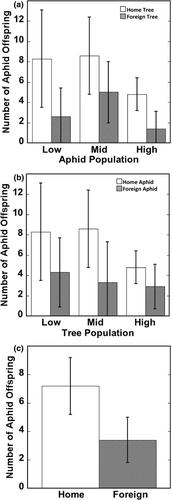当前位置:
X-MOL 学术
›
Ecol. Evol.
›
论文详情
Our official English website, www.x-mol.net, welcomes your
feedback! (Note: you will need to create a separate account there.)
Local adaptation and rapid evolution of aphids in response to genetic interactions with their cottonwood hosts
Ecology and Evolution ( IF 2.3 ) Pub Date : 2020-09-02 , DOI: 10.1002/ece3.6709 Stuart C Wooley 1, 2 , David Solance Smith 3, 4 , Eric V Lonsdorf 5, 6 , Sarah C Brown 1 , Thomas G Whitham 3, 7 , Stephen M Shuster 3 , Richard L Lindroth 1
Ecology and Evolution ( IF 2.3 ) Pub Date : 2020-09-02 , DOI: 10.1002/ece3.6709 Stuart C Wooley 1, 2 , David Solance Smith 3, 4 , Eric V Lonsdorf 5, 6 , Sarah C Brown 1 , Thomas G Whitham 3, 7 , Stephen M Shuster 3 , Richard L Lindroth 1
Affiliation

|
Several studies have demonstrated the ecological consequences of genetic variation within a single plant species. For example, these studies show that individual plant genotypes support unique composition of the plants' associated arthropod community. By contrast, fewer studies have explored how plant genetic variation may influence evolutionary dynamics in the plant's associated species. Here, we examine how aphids respond evolutionarily to genetic variation in their host plant. We conducted two experiments to examine local adaptation and rapid evolution of the free‐feeding aphid Chaitophorus populicola across genetic variants of its host plant, Populus angustifolia. To test for local adaptation, we collected tree cuttings and aphid colonies from three sites along an elevation/climate gradient and conducted a reciprocal transplant experiment. In general, home aphids (aphids transplanted onto trees from the same site) produced 1.7–3.4 times as many offspring as foreign aphids (aphids transplanted onto trees from different sites). To test for rapid evolution, we used 4 clonally replicated aphid genotypes and transplanted each onto 5 clonally replicated P. angustifolia genotypes. Each tree genotype started with the same aphid genotype composition. After 21 days (~two aphid generations), aphid genotype composition changed (i.e., aphids evolved) and some tree genotypes supported unique evolutionary trajectories of aphids. These results suggest that plant evolution in response to human perturbation, such as climate change and invasive species, will also result in evolutionary responses in strongly interacting species that could cascade to affect whole communities.
中文翻译:

蚜虫响应与棉白杨宿主遗传相互作用的局部适应和快速进化
几项研究已经证明了单一植物物种内遗传变异的生态后果。例如,这些研究表明,单个植物基因型支持植物相关节肢动物群落的独特组成。相比之下,很少有研究探索植物遗传变异如何影响植物相关物种的进化动态。在这里,我们研究了蚜虫如何在进化上对其寄主植物的遗传变异做出反应。我们进行了两项实验,以检验自由进食的蚜虫Chaitophorus populicola在其寄主植物杨树 ( Populus angustifolia ) 的遗传变异中的局部适应和快速进化。为了测试当地的适应性,我们沿着海拔/气候梯度从三个地点收集了树木插枝和蚜虫群落,并进行了相互移植实验。一般来说,本土蚜虫(从同一地点移植到树木上的蚜虫)产生的后代数量是外来蚜虫(从不同地点移植到树木上的蚜虫)的1.7-3.4倍。为了测试快速进化,我们使用了 4 个克隆复制的蚜虫基因型,并将每个基因型移植到 5 个克隆复制的P. angustifolia基因型上。每个树基因型都以相同的蚜虫基因型组成开始。 21天后(约两代蚜虫),蚜虫基因型组成发生变化(即蚜虫进化),一些树基因型支持蚜虫独特的进化轨迹。这些结果表明,植物响应人类扰动(例如气候变化和入侵物种)的进化也将导致强烈相互作用的物种的进化反应,这些反应可能会级联影响整个群落。
更新日期:2020-10-12
中文翻译:

蚜虫响应与棉白杨宿主遗传相互作用的局部适应和快速进化
几项研究已经证明了单一植物物种内遗传变异的生态后果。例如,这些研究表明,单个植物基因型支持植物相关节肢动物群落的独特组成。相比之下,很少有研究探索植物遗传变异如何影响植物相关物种的进化动态。在这里,我们研究了蚜虫如何在进化上对其寄主植物的遗传变异做出反应。我们进行了两项实验,以检验自由进食的蚜虫Chaitophorus populicola在其寄主植物杨树 ( Populus angustifolia ) 的遗传变异中的局部适应和快速进化。为了测试当地的适应性,我们沿着海拔/气候梯度从三个地点收集了树木插枝和蚜虫群落,并进行了相互移植实验。一般来说,本土蚜虫(从同一地点移植到树木上的蚜虫)产生的后代数量是外来蚜虫(从不同地点移植到树木上的蚜虫)的1.7-3.4倍。为了测试快速进化,我们使用了 4 个克隆复制的蚜虫基因型,并将每个基因型移植到 5 个克隆复制的P. angustifolia基因型上。每个树基因型都以相同的蚜虫基因型组成开始。 21天后(约两代蚜虫),蚜虫基因型组成发生变化(即蚜虫进化),一些树基因型支持蚜虫独特的进化轨迹。这些结果表明,植物响应人类扰动(例如气候变化和入侵物种)的进化也将导致强烈相互作用的物种的进化反应,这些反应可能会级联影响整个群落。











































 京公网安备 11010802027423号
京公网安备 11010802027423号